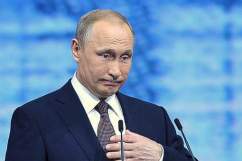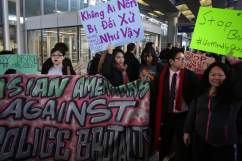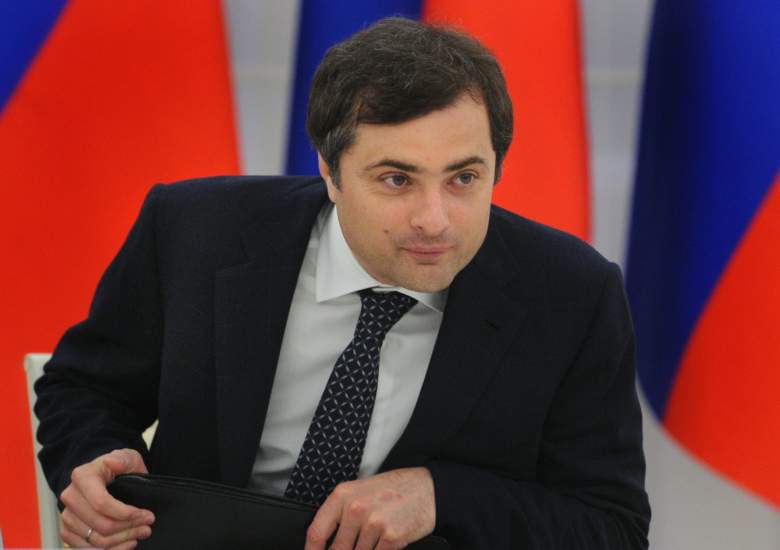
Vladislav Surkov (Getty)
President Donald Trump‘s administration will appoint a special envoy to open up a communication line with a top aide to Russian President Vladimir Putin, a report from BuzzFeed said.
The United States envoy hasn’t yet been named, but he or she would communicate directly with Vladislav Surkov, a longtime Russian aide and businessman.
The report said that the new U.S. envoy’s role would primarily be to negotiate the future of Ukraine. The country has undergone three years of conflict and it’s still ongoing despite a peace deal that was signed.
The new communication channel between the White House and the Kremlin was reportedly approved by German Chancellor Angela Merkel when she met with Trump in Washington in March, and Secretary of State Rex Tillerson would be tasked with selecting the envoy’s lineup.
The creation of such an envoy hasn’t yet been confirmed by the White House, though an official told BuzzFeed that they were floating around the idea.
Surkov, who was once known as the Kremlin’s “grey cardinal,” has actively been involved with the Russian government since 1999. He has been married twice and has four children between the two wives.
Here’s what you need to know about Surkov:
1. Surkov Has Served as Putin’s Personal Advisor Since 2013 & Was Accused of Ordering Snipers to Kill Protesters In Ukraine
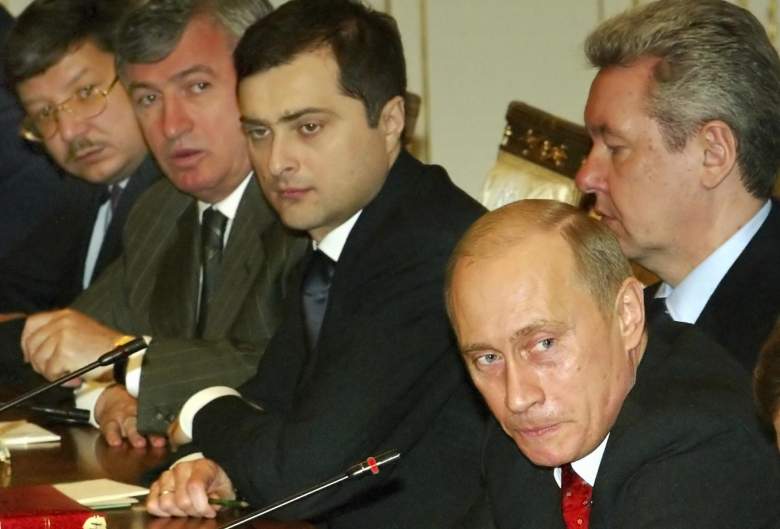
Russian President Vladimir Putin, right, listens during a meeting with Russian business executives, including Vladislav Surkov, left, in 2006.
(Mikhail Metzel/Getty)
After having extensive roles within the Russian government, Surkov was tabbed to be Putin’s top aide in September 2013. Soon enough, Surkov became influential in Putin’s views on relationships with Abkhazia, South Ossetia and Ukraine.
After the Crimean status referendum in March 2014, Surkov was one of the first 11 people that were handed down sanctions as part of an executive order signed by President Barack Obama. Surkov was added to the Specially Designated Nationals List, which froze his assets inside of the U.S. and also banned his entry into the country.
Surkov made a statement after the sanctions were handed down that seemed as if he were mocking the process. He said that he has no interest in the U.S. and doesn’t need to enter the country in order to fulfill his needs.
The only things that interest me in the US are Tupac Shakur, Allen Ginsberg, and Jackson Pollock. I don’t need a visa to access their work.
A similar sanction was made by the European Union in 2014, adding him to its sanction list, freezing his assets and barring entry to Europe.
Perhaps the most jarring allegation against Surkov came in February 2015, when authorities from Ukraine said that Surkov ordered snipers to shoot and kill protesters and police officers during the Euromaidan, a time of civil unrest and demonstrations in Ukraine that led to the 2014 Ukrainian revolution.
The Kremlin dismissed the accusations against Surkov, calling them “absurd.”
In October 2016, over 2,000 emails belonging to Surkov were hacked and released by a Ukrainian hacker group. The emails belonged to Surkov’s office and showed that Russia had plans to destabilize Ukraine and had coordinated with opposition leaders in the country.
The Kremlin denied the allegations and called the email leak “fake.”
2. Surkov Was Accused of Being a ‘Puppet Master’ When He Was Russia’s First Deputy Chief
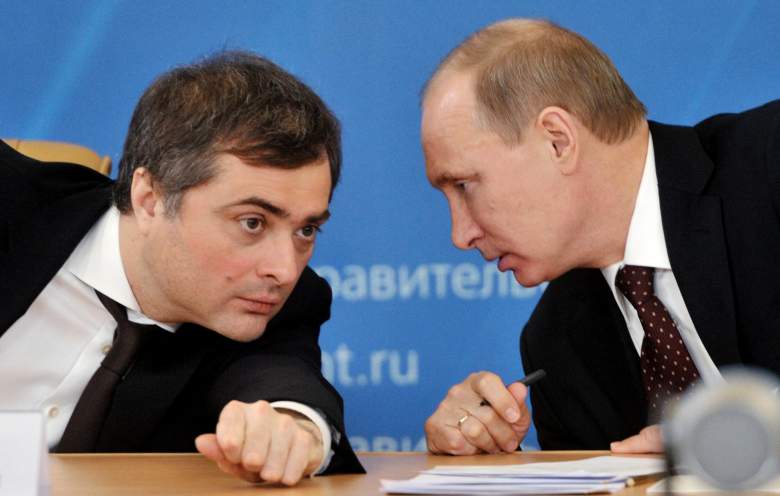
Russia’s then Prime Minister Vladimir Putin confers with Vladislav Surkov in 2012. (Alexei Nikolsky/Getty)
Surkov is a businessman in Russia and got his first role within the government in 1999 when he was appointed the first deputy chief of the Russian Presidential Administration. During his 12-year tenure, he was seen as the “main ideologist of the Kremlin.”
Surkov started mainly as a public relations mouthpiece for the Kremlin and made headlines in 2000 when he announced that the Kremlin had purchased a company that owned the only independent, national television channel, NTV.
Surkov was appointed as an aide to the president in March 2004 and continued to advocate for sovereign democracy so that the country could counter the promotion of democracy created by the U.S. and some European states.
Surkov had been accused of being the “puppet master” of Right Cause, a political party in Russia. Calls were made for him to be fired from his position within the Kremlin because of his alleged stranglehold on the party, but the Russian government stuck with him despite the accusations.
3. Surkov Has Been Accused Of ‘Intimidating Russian Journalists’ & Limiting Freedom of Speech
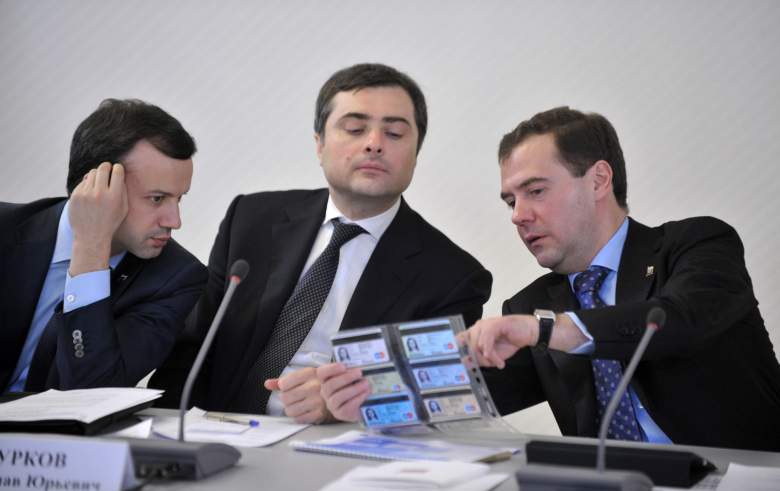
Then Russian President Dmitry Medvedev, right, speaks with the presidential staff’s first deputy chief Vladislav Surkov, center, and chief presidential economics advisor Arkady Dvorkovich in 2011. (Dmitry Kostyukov/Getty)
In 2010, there was a U.S.-Russia “Civil Society to Civil Society” summit planned that Surkov was set to attend.
But Republican Rep. Ileana Ros-Lehtinen of Florida’s 27th district wrote a petition that called for President Obama’s administration to suspend U.S. participation in the summit unless Surkov was replaced. She explained in an interview that she rejected Surkov’s attendance at the summit because she saw him as “one of the main propagators of limiting freedom of speech in Russia, intimidating Russian journalists and representatives of opposition political parties.”
The summit went on, though, despite her request.
The allegations of Surkov limiting journalists’ powers are much greater in Russia. In September 2010, appeals were made to dismiss him from his position in the government because of policies that threatened freedom of the press.
In a 2013 article by The Economist, Surkov was labeled as the engineer of “a system of make-believe” in Russia, alleging that he manages the media and creates fake social movements.
4. Journalists Have Speculated He Has Published Novels Using a Pseudonym
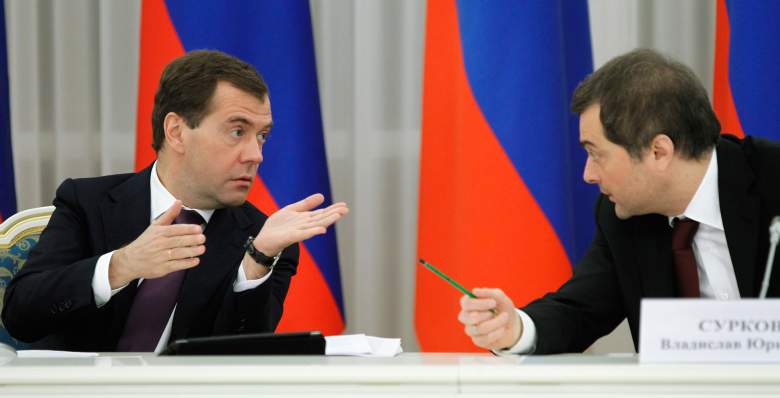
Then Russian President Dmitry Medvedev, left, speaks with Deputy Prime Minister Vladislav Surkov in 2012. (Dmitry Astakhov/Getty)
Many Russian journalists believe that Surkov is an author who writes under the pseudonym Nathan Dubovitsky.
In August 2009, a Russian newspaper reported that Surkov was the author of a novel titled Close to Zero under the Dubovitsky name. It was discovered that Dubovitsky is nearly the same surname as Surkov’s wife, Natalya Dubovitskaya, leading to further speculation.
The novel describes a character who is in dramatic public relations world, where companies have their own gangs. The character is tasked with overseeing the reputation of an up-and-coming governor. The character hires a ghostwriter to pen poetry under the name of the governor so that he or she could win an award and seem “clever.” After the poetry, the PR character bribes reporters to correct stories that are negative against the governor.
In the novel, Surkov writes a preface under his real name, though he denied writing the rest of the main text. To fuel the fire, Surkov wrote two statements about the book that were contradictory.
In the first, he wrote that “the author of this novel is an unoriginal Hamlet-obsessed hack.” In the second, he said “this is the best book I have ever read.”
Then when the book was adapted to a theatrical version, Surkov was in attendance at its debut performance.
Dubovitsky published two other novels, Without Sky and The Machine and the Giant.
5. Surkov Had a Successful Business Career Before Working In the Government
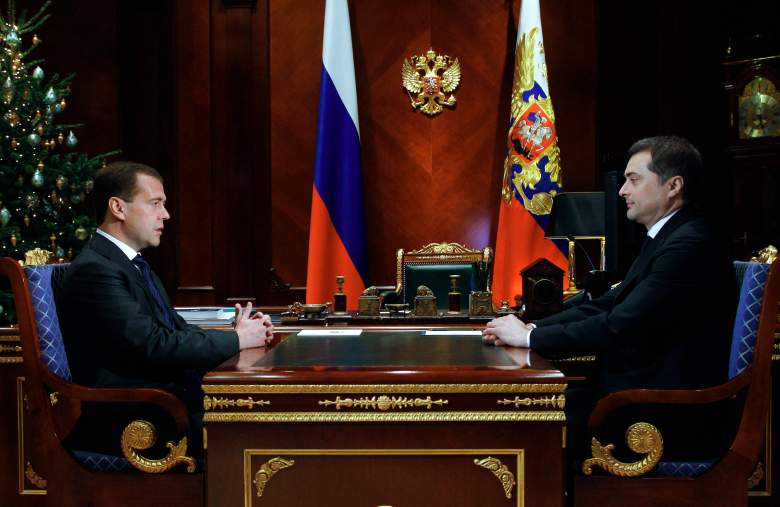
In 2011, Russia’s President Dmitry Medvedev, left, speaks with former Kremlin first deputy chief of staff, Vladislav Surkov. (Getty)
Once the Russian government lifted bans against private businesses in the late 1980s, Surkov started working for one.
Surkov worked as the head of the advertising department for Mikhail Khodorkovsky, a now-exiled businessman and philanthropist, in 1988. From 1991-1996, Surkov moved around as the manager in advertising and public relations departments at Khodorkovsky’s company, Bank Menatep.
Khodorkovsky was believed to be the richest man in Russia in 2003 with an estimated net worth of $15 billion. He was arrested and charged with fraud in October 2003 and sentenced to nine years in prison. He ended up being pardoned by Putin on December 20, 2013.
Surkov moved on from Bank Menatep and worked for Rosprom for one year until 1997 when he worked at Alfa-Bank.
Surkov moved up in the Russian business world and was elected in 2004 as the president of the board of directors for Transnefteproduct, an oil product transportation company. When he moved further up in the government, however, he was advised to give up the position and did so in February 2006.
